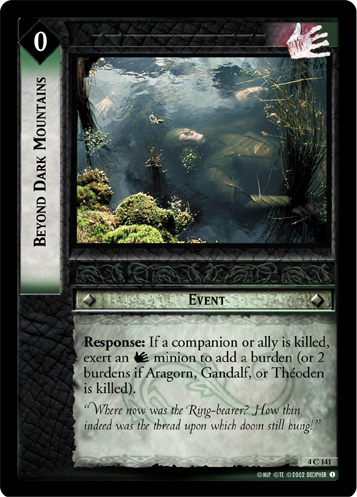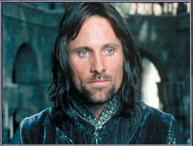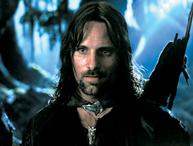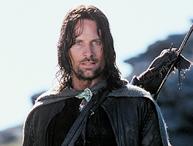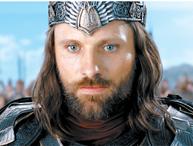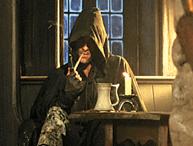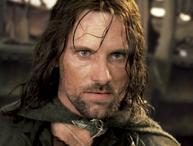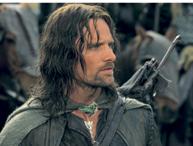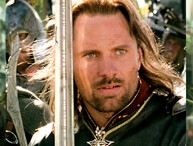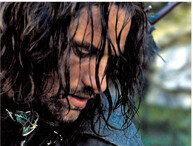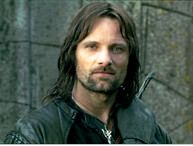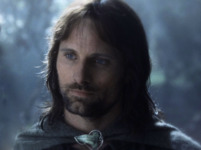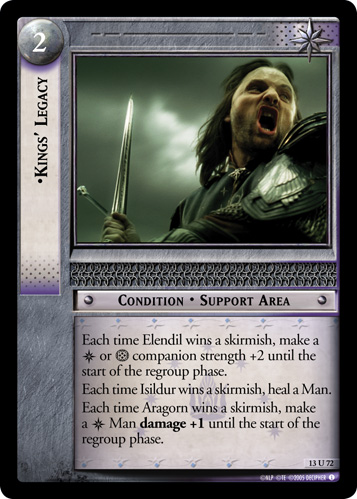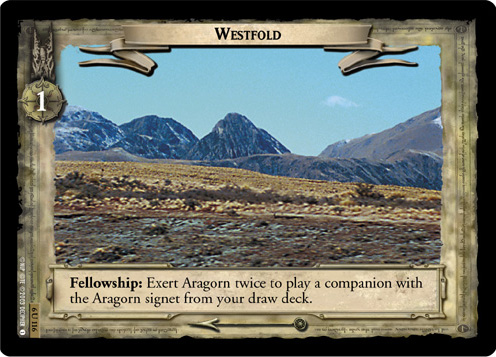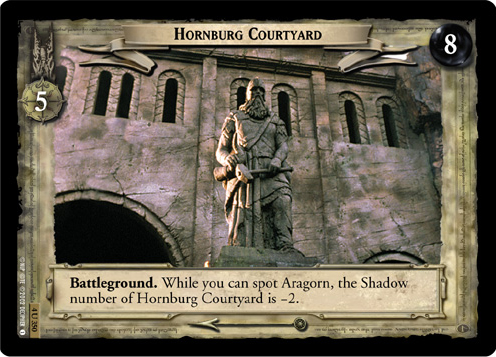Aragorn
Ranger of the North and heir to the throne of Gondor, Aragorn is one of the protagonists of The Lord of the Rings. In this game, he is a versatile and powerful Free Peoples Man companion, one of the main characters of Gondor culture. There are many different versions of Aragorn, as he appears in roughly half of the sets, and different versions appear in both
Gondor decks and splashed into other decks.
Most versions of Aragorn sport 8 strength and 4 vitality. He's usually hard to fit into a starting Fellowship, because of his high Twilight cost, but he's a hardy companion that stays on the table. In fact, he was at least tied for the highest-vitality companion in the game until Reflections introduced his ancestor, Elendil, The Tall (9R+32)
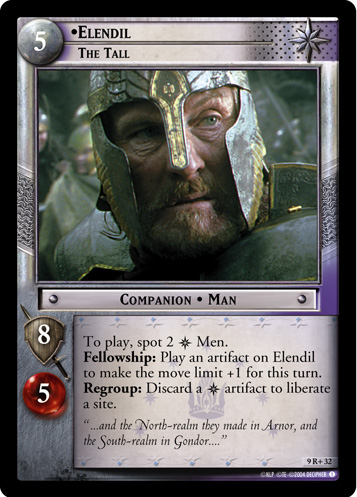 . Most versions of Aragorn emphasize his prowess in battle, like Aragorn, Ranger of the North (1R89)
. Most versions of Aragorn emphasize his prowess in battle, like Aragorn, Ranger of the North (1R89)
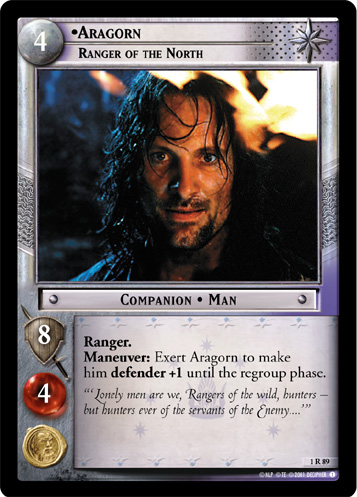 , or his ability to lead and heal his allies, with cards like Aragorn, King in Exile (1P365)
, or his ability to lead and heal his allies, with cards like Aragorn, King in Exile (1P365)
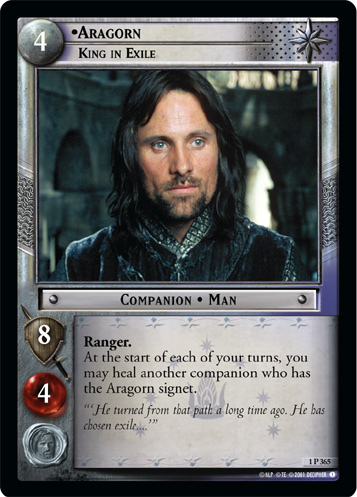 .
.
Aragorn is especially popular in Fellowship Block. This is in part simply because of his body: there are few hardier companions in a skirmish in the first block. It's also because of The Prancing Pony (1U324)
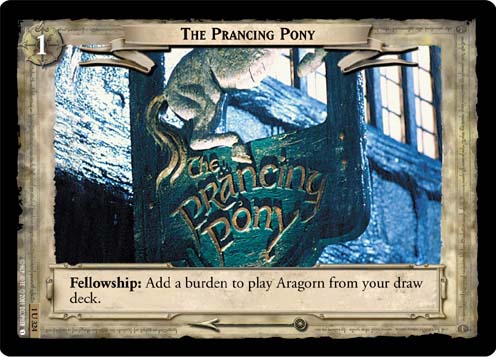 , which can cheaply download him early in the game even if he isn't in your starting hand or Fellowship. Even if you aren't using the Prancing Pony yourself, it's so common that it's often a good idea to include Aragorn (and maybe Ranger’s Sword (1U112)
, which can cheaply download him early in the game even if he isn't in your starting hand or Fellowship. Even if you aren't using the Prancing Pony yourself, it's so common that it's often a good idea to include Aragorn (and maybe Ranger’s Sword (1U112)
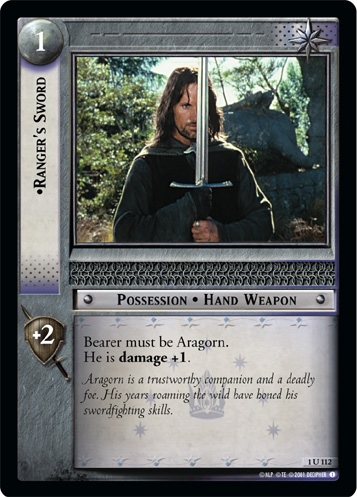 and Aragorn’s Bow (1R90)
and Aragorn’s Bow (1R90)
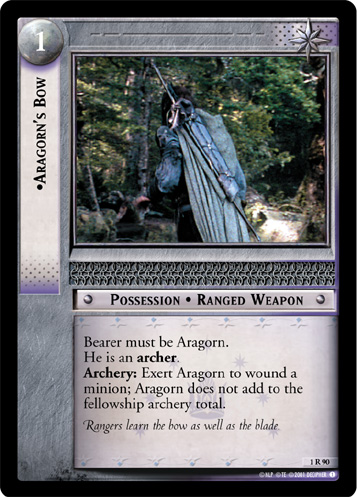 ) just on the chance that your opponent might be using it. In later formats, you can also download Aragorn with The Riddermark (4U328)
) just on the chance that your opponent might be using it. In later formats, you can also download Aragorn with The Riddermark (4U328)
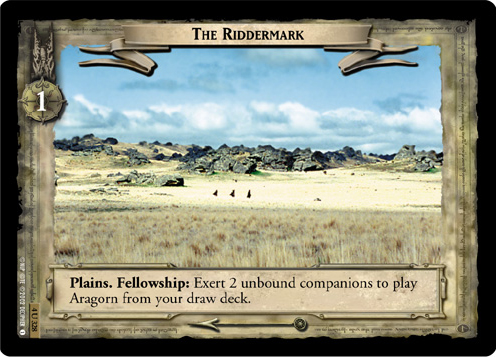 , The Prancing Pony (11S256)
, The Prancing Pony (11S256)
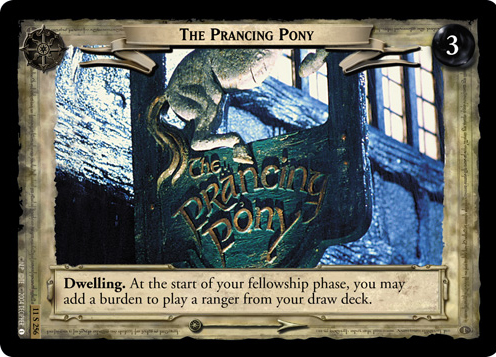 , or East Wall of Rohan (15S190)
, or East Wall of Rohan (15S190)
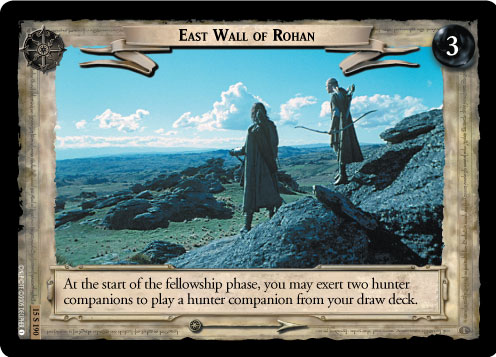 , but not on the King Block site path used in Movie Block and King Standard.
, but not on the King Block site path used in Movie Block and King Standard.
He has an interesting relationship with cultural enforcement. There are many versions of Aragorn that you can splash into any deck. For example, Aragorn, Ranger of the North (1R89)
 is a solid skirmisher that, if needed, can hold off many minions, if only for a turn. Aragorn, Strider (11R54)
is a solid skirmisher that, if needed, can hold off many minions, if only for a turn. Aragorn, Strider (11R54)
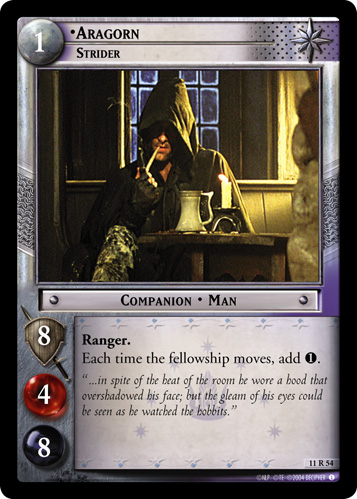 is a very cheap inclusion in a starting Fellowship, albeit at a high long-term price. On the other hand, nearly every set-wide
is a very cheap inclusion in a starting Fellowship, albeit at a high long-term price. On the other hand, nearly every set-wide Gondor culture gimmick has an accompanying version of Aragorn. It's hard to say if being a ranger is a Gondorian gimmick that Aragorn shares, or an Aragorn gimmick he shares with the rest of the culture, and the many versions of Aragorn with the ranger keyword can use cards like No Stranger to the Shadows (1U108)
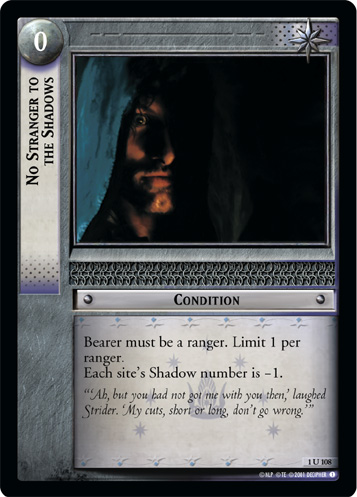 , Pathfinder (1C110)
, Pathfinder (1C110)
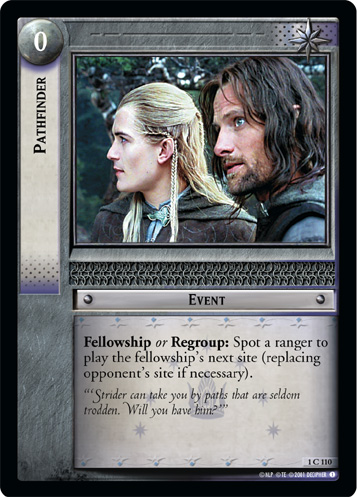 , or What Are They? (1C119)
, or What Are They? (1C119)
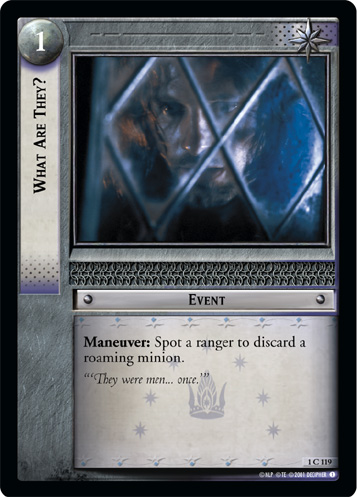 . Aragorn, Driven by Need (7P364)
. Aragorn, Driven by Need (7P364)
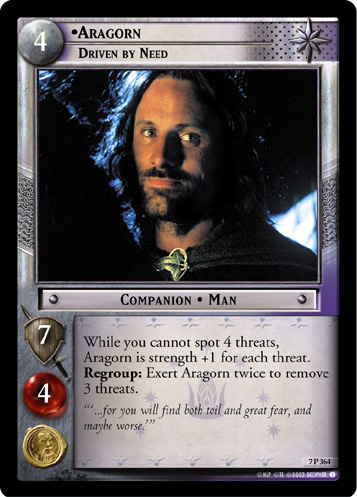 helps
helps Gondor wraith decks manage threats. Aragorn, Captain of Gondor (7C81)
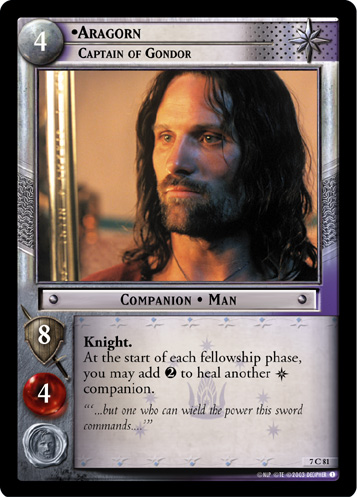 is a knight for knight decks and helps them heal off the exertions from using fortifications, and so on.
is a knight for knight decks and helps them heal off the exertions from using fortifications, and so on.
Aragorn is also often a key card in decks that run two main cultures, befitting his eventual role as the leader of the Free Peoples. There are versions of Aragorn made specifically to support other cultures, like Aragorn, Wingfoot (4P364)
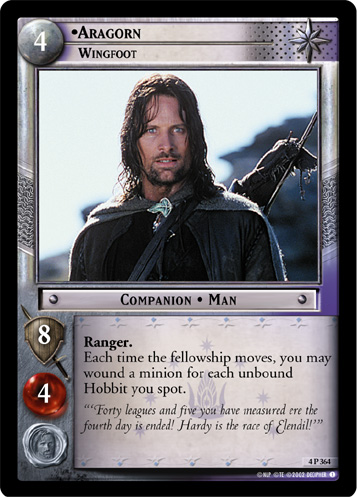 . He's also the only Free Peoples character to appear in a different culture, appearing once in
. He's also the only Free Peoples character to appear in a different culture, appearing once in Rohan with Aragorn, Defender of Rohan (17R93)
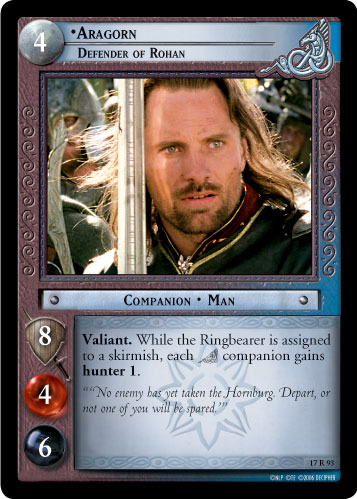 , a card that buffs other Valiant companions. Cards like Aragorn, Defender of Free Peoples (6R50)
, a card that buffs other Valiant companions. Cards like Aragorn, Defender of Free Peoples (6R50)
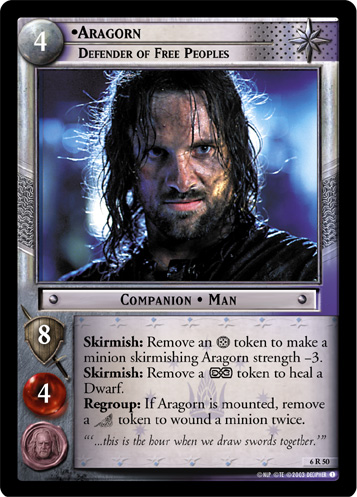 and Aragorn, Elessar Telcontar (10R25)
and Aragorn, Elessar Telcontar (10R25)
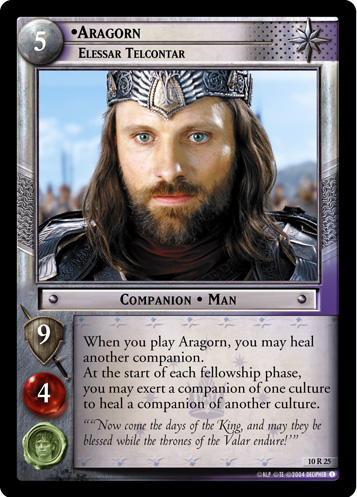 affect many other Free Peoples cultures at once, allowing them to fit in either decks that run both cultures—perhaps using cards like The Last Alliance of Elves and Men (1R49)
affect many other Free Peoples cultures at once, allowing them to fit in either decks that run both cultures—perhaps using cards like The Last Alliance of Elves and Men (1R49)
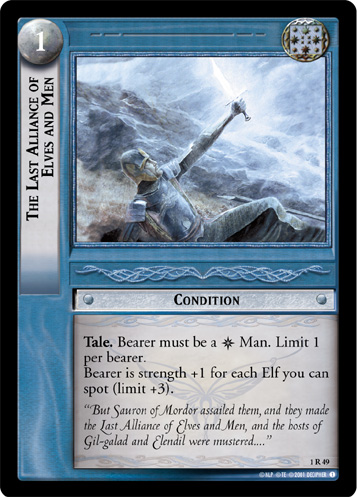 , Gift of the Evenstar, Blessed Light (15U16)
, Gift of the Evenstar, Blessed Light (15U16)
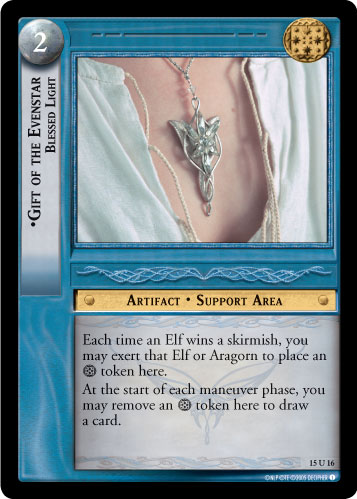 , or Help in Doubt and Need (4R124)
, or Help in Doubt and Need (4R124)
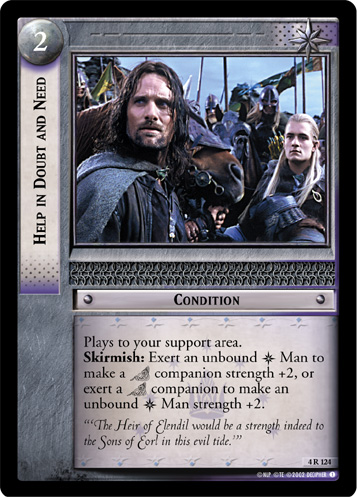 —or simply in Rainbow decks running many cultures. There's even a rainbow deck focused on Aragorn in particular: Aragorn, King in Exile (1P365)
—or simply in Rainbow decks running many cultures. There's even a rainbow deck focused on Aragorn in particular: Aragorn, King in Exile (1P365)
 can heal characters of any culture as long as they have an Aragorn signet, and that includes at least one version of all of the main Free Peoples unique characters.
can heal characters of any culture as long as they have an Aragorn signet, and that includes at least one version of all of the main Free Peoples unique characters.
Aragorn also has powerful artifact and possession cards that only he can use. Aragorn’s Bow (1R90)
 and Aragorn’s Bow, Ranger's Longbow (15R56)
and Aragorn’s Bow, Ranger's Longbow (15R56)
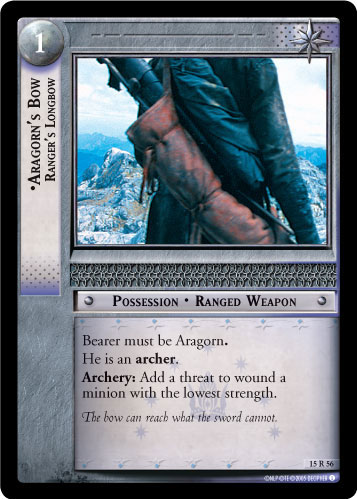 are each one of the strongest direct wounding tools in their respective formats. Andúril, Flame of the West (7R79)
are each one of the strongest direct wounding tools in their respective formats. Andúril, Flame of the West (7R79)
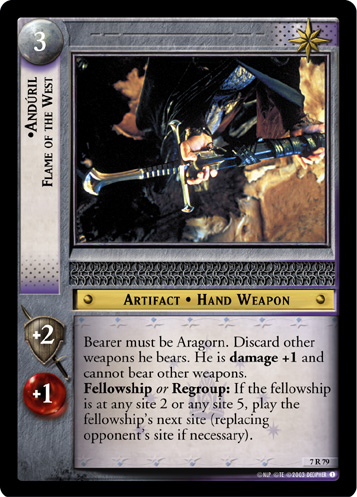 is a strong weapon just from its base stats and only becomes more important in Expanded with its site manipulation ability, although it cannot be played with either version of his bow. (Andúril, Sword That Was Broken (17R27)
is a strong weapon just from its base stats and only becomes more important in Expanded with its site manipulation ability, although it cannot be played with either version of his bow. (Andúril, Sword That Was Broken (17R27)
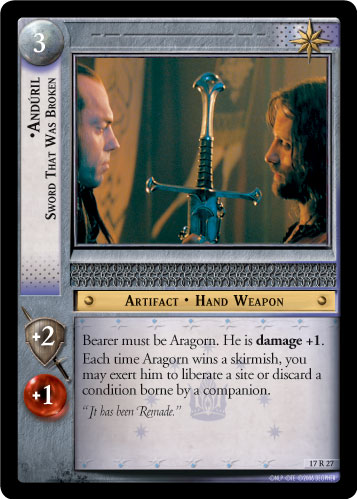 is compatible with his bow, but has weaker gametext.) Ring of Barahir (6R55)
is compatible with his bow, but has weaker gametext.) Ring of Barahir (6R55)
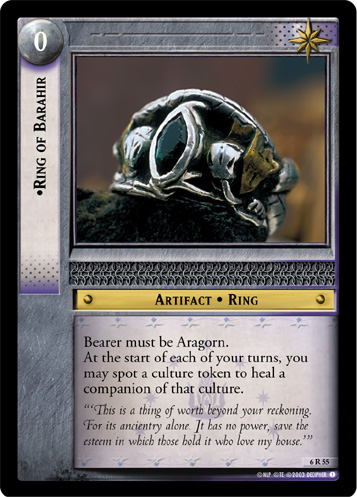 is a cheap, versatile healing tool that can be downloaded by The One Ring, The Binding Ring (9R+1)
is a cheap, versatile healing tool that can be downloaded by The One Ring, The Binding Ring (9R+1)
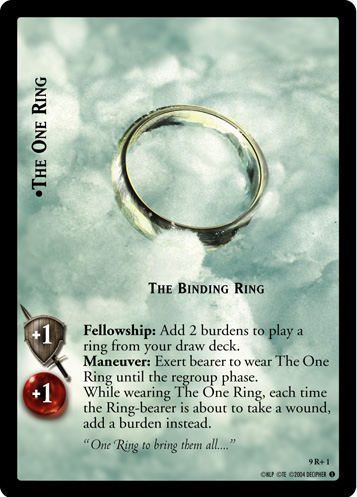 . Most of the rest of his exclusive equipment consists of hand weapons like Ranger’s Sword (1U112)
. Most of the rest of his exclusive equipment consists of hand weapons like Ranger’s Sword (1U112)
 , Andúril, King's Blade (7R80)
, Andúril, King's Blade (7R80)
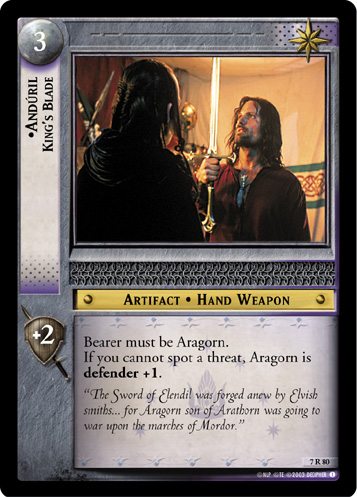 , or Ranger's Sword, Blade of Aragorn (4U132)
, or Ranger's Sword, Blade of Aragorn (4U132)
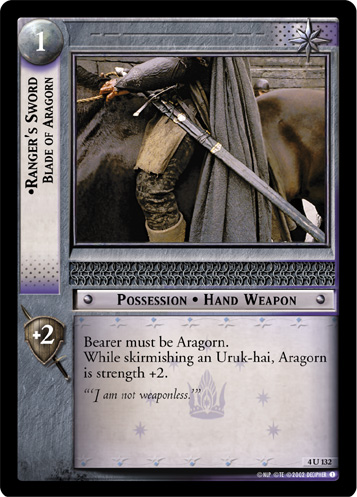 , which are unremarkable but better than most generic
, which are unremarkable but better than most generic Gondor hand weapons except for Ithilien Blade (15C62)
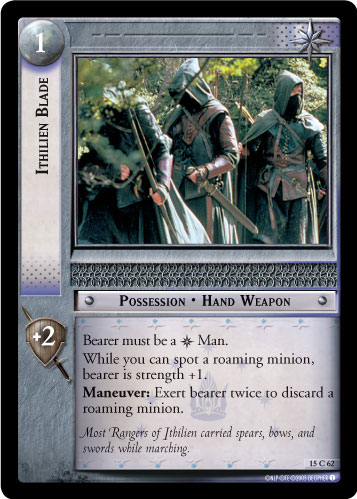 .
.
The only Aragorn hate card of any note is Can You Protect Me From Yourself? (3R50)
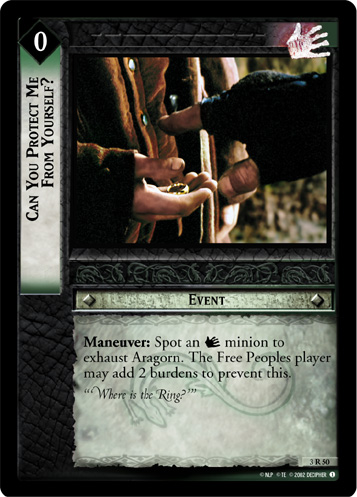 , and it's weaker than the similar cards for Boromir, Galadriel, and Gandalf. It can't kill him, only exhaust him, and exhausting Aragorn while he's already exhausted has no effect. If keeping Aragorn healthy is important, two burdens is a small price to pay, especially since
, and it's weaker than the similar cards for Boromir, Galadriel, and Gandalf. It can't kill him, only exhaust him, and exhausting Aragorn while he's already exhausted has no effect. If keeping Aragorn healthy is important, two burdens is a small price to pay, especially since Isengard culture does not tend to place many burdens.
Versions of Aragorn[edit]
| Portrait | Name | Game Text |
|---|---|---|
Aragorn, Ranger of the North (1R89)

|
Ranger.
Maneuver: Exert Aragorn to make him defender +1 until the regroup phase. | |
Aragorn, King in Exile (1P365)

|
Ranger. At the start of each of your turns, you may heal another companion who has the Aragorn signet. | |
Aragorn, Heir to the White City (3R38)
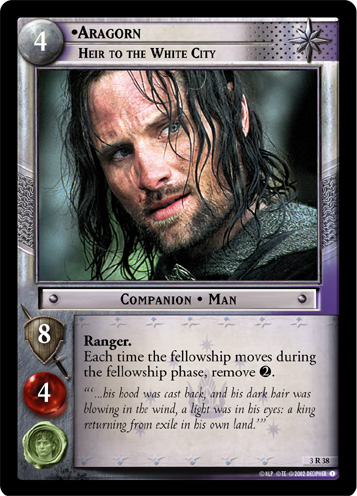
|
Ranger.
Each time the fellowship moves during the fellowship phase, remove | |
Aragorn, Heir of Elendil (4C109)
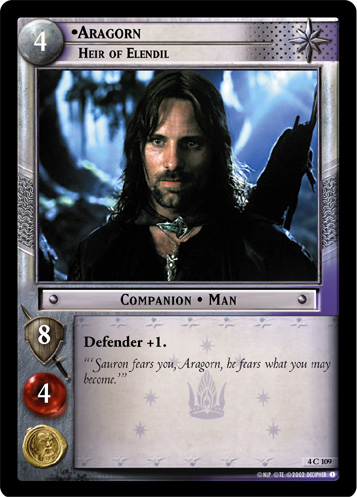
|
Defender +1. | |
Aragorn, Wingfoot (4P364)

|
Ranger.
Each time the fellowship moves, you may wound a minion for each unbound Hobbit you spot. | |
Aragorn, Defender of Free Peoples (6R50)

|
Skirmish: Remove an | |
Aragorn, Captain of Gondor (7C81)

|
Knight.
At the start of each fellowship phase, you may add | |
Aragorn, Driven by Need (7P364)

|
While you cannot spot 4 threats, Aragorn is strength +1 for each threat.
Regroup: Exert Aragorn twice to remove 3 threats. | |
Aragorn, Elessar Telcontar (10R25)

|
When you play Aragorn, you may heal another companion. At the start of each fellowship phase, you may exert a companion of one culture to heal a companion of another culture. | |
Aragorn, Guide and Protector (11S53)
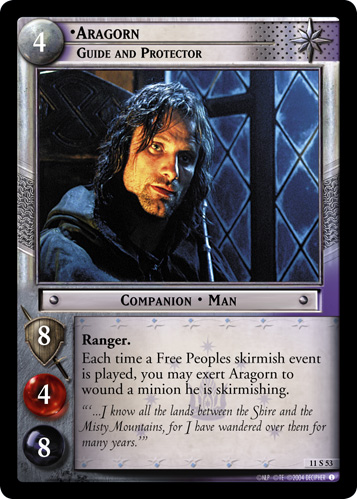
|
Ranger. Each time a Free Peoples skirmish event is played, you may exert Aragorn to wound a minion he is skirmishing. | |
Aragorn, Strider (11R54)

|
Ranger. Each time the fellowship moves, add | |
Aragorn, Isildur's Heir (13R59)
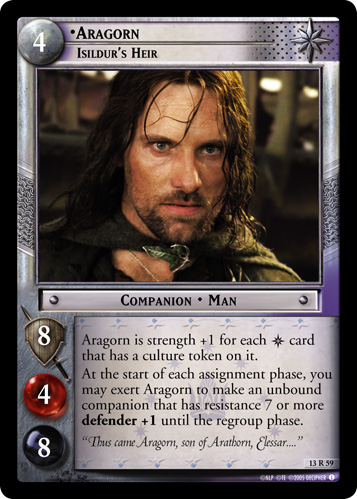
|
Aragorn is strength +1 for each At the start of each assignment phase, you may exert Aragorn to make an unbound companion that has resistance 7 or more defender +1 until the regroup phase. | |
Aragorn, Swift Hunter (15S54)
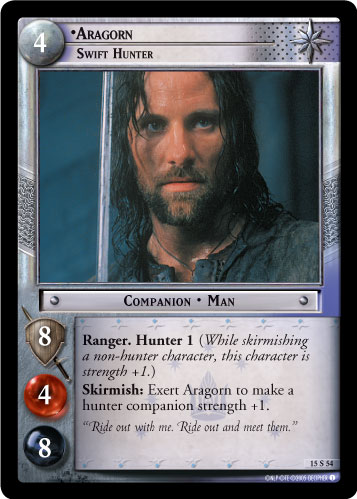
|
Ranger. Hunter 1. (While skirmishing a non-hunter character, this character is strength +1.)
Skirmish: Exert Aragorn to make a hunter companion strength +1. | |
Aragorn, Thorongil (15R55)
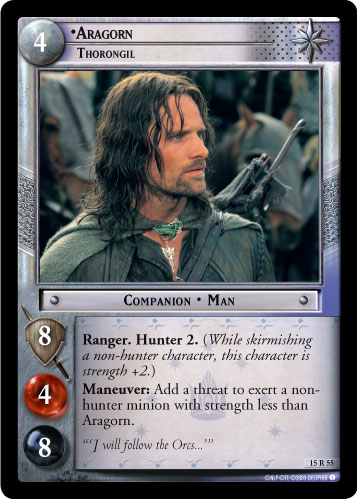
|
Ranger. Hunter 2. (While skirmishing a non-hunter character, this character is strength +2.)
Maneuver: Add a threat to exert a non-hunter minion with strength less than Aragorn's. | |
Aragorn, Defender of Rohan (17R93)

|
Valiant.
While the Ring-bearer is assigned to a skirmish, each | |
Aragorn, Heir to the Throne of Gondor (18R38)
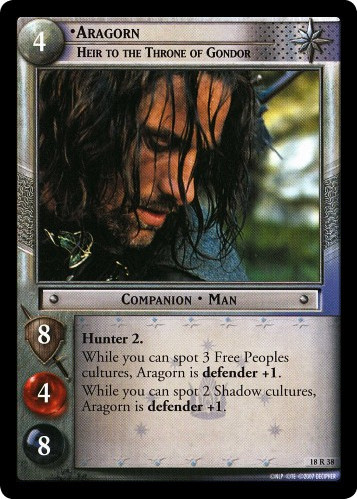
|
Hunter 2.
While you can spot 3 Free Peoples cultures, Aragorn is defender +1. While you can spot 2 Shadow cultures, Aragorn is defender +1. | |
Aragorn, Well-traveled Guide (19P12)
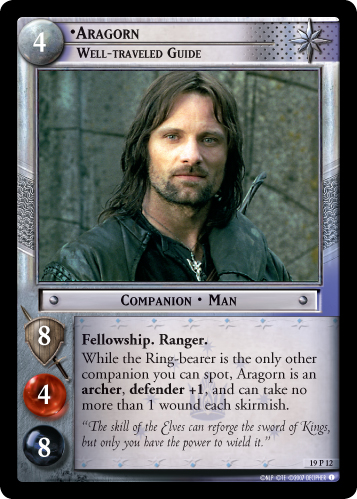
|
Fellowship. Ranger.
While the Ring-bearer is the only other companion you can spot, Aragorn is an archer, defender +1, and can take no more than 1 wound each skirmish. | |
Aragorn, Last Hope of Men (V2_16)
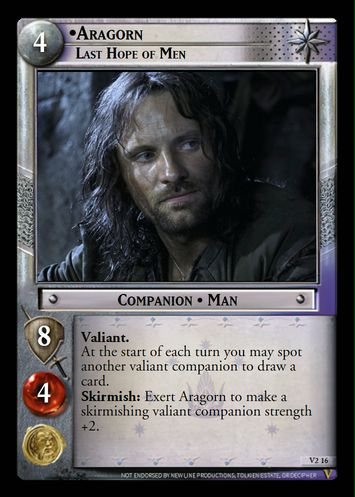
|
Valiant.
At the start of each turn you may spot another valiant companion to draw a card. Skirmish: Exert Aragorn to make a skirmishing valiant companion strength +2. | |
Aragorn, Estel (V1_19)
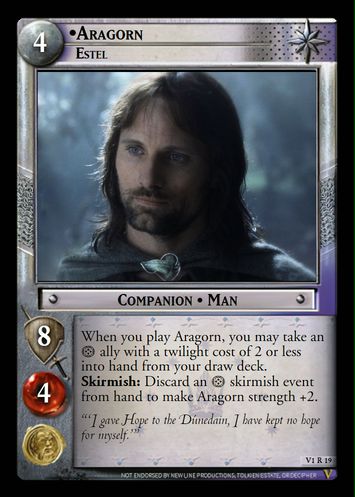
|
When you play Aragorn, you may take an Skirmish: Discard an | |
Aragorn, King of Gondor and Arnor (V3_19)
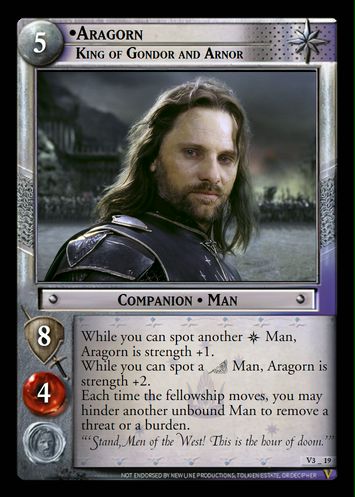
|
While you can spot another While you can spot a Each time the fellowship moves, you may hinder another unbound Man to remove a threat or a burden. |
Cards which mention Aragorn by name[edit]
Free Peoples[edit]
All cards are Gondor culture unless mentioned otherwise.
- Aragorn’s Bow (1R90)

- Arwen's Fate (1R93)
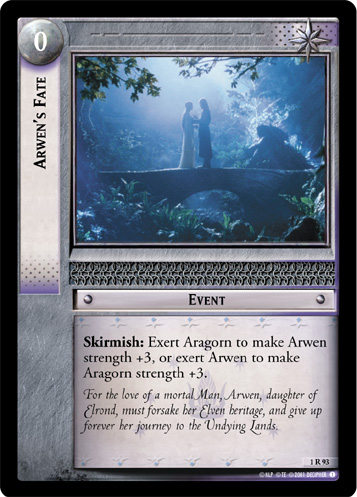
- The Choice of Lúthien (1R100)
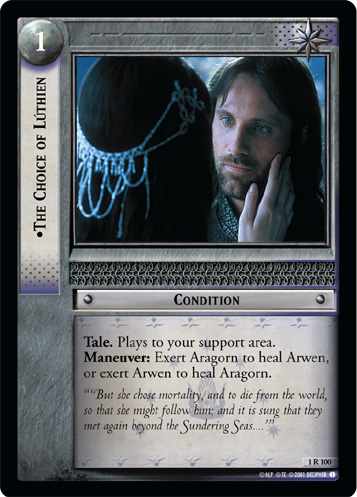
- One Whom Men Would Follow (1U109)
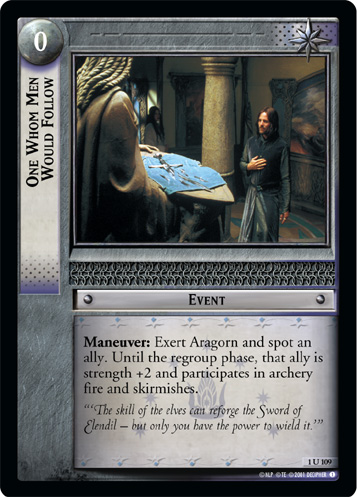
- Ranger’s Sword (1U112)

- Valiant Man of the West (1R118)
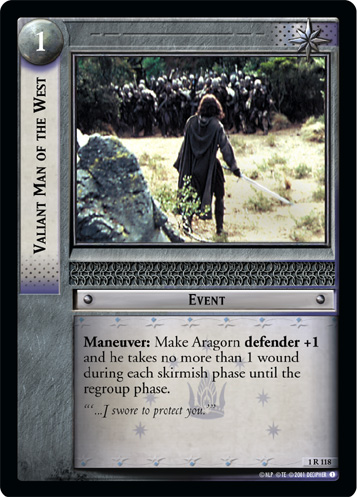
- No Mere Ranger (2R36)
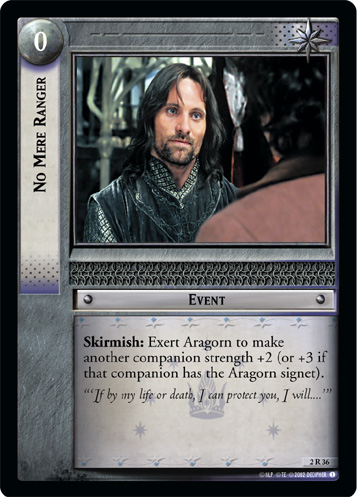
- Pippin, Mr. Took (2C110)
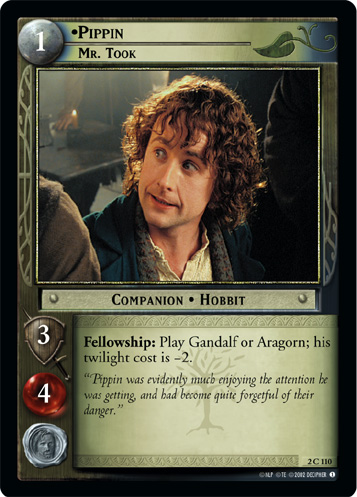 -
- Shire
- Gift of the Evenstar (3R19)
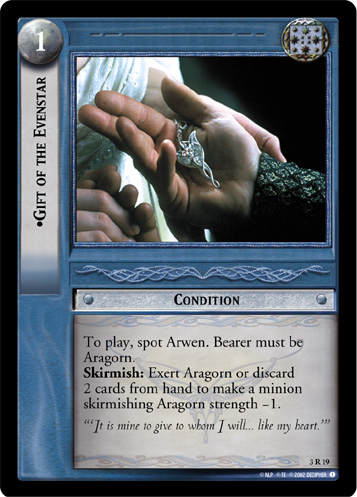 -
- Elven
- Voice of Rauros (3U47)
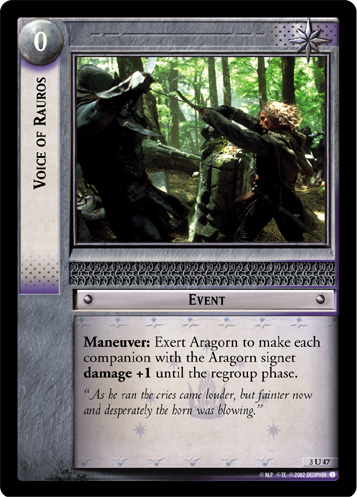
- Hard Choice (4U123)
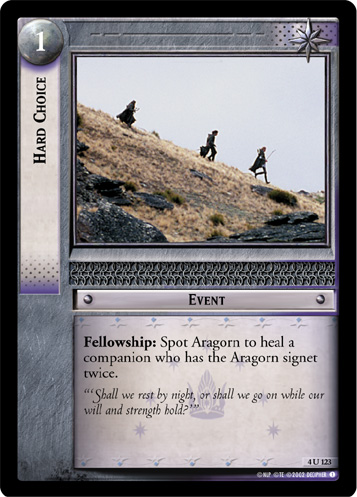
- Ranger's Sword, Blade of Aragorn (4U132)

- These Are My People (5R41)
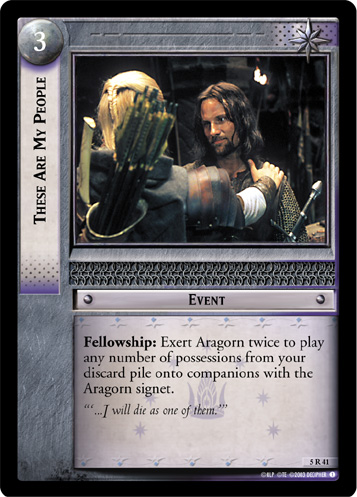
- Ring of Barahir (6R55)

- Elrond, Elven Lord (7R21)
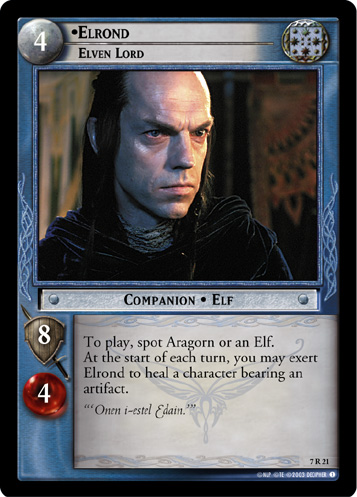 -
- Elven
- Andúril, Flame of the West (7R79)

- Andúril, King's Blade (7R80)

- Noble Leaders (7R112)
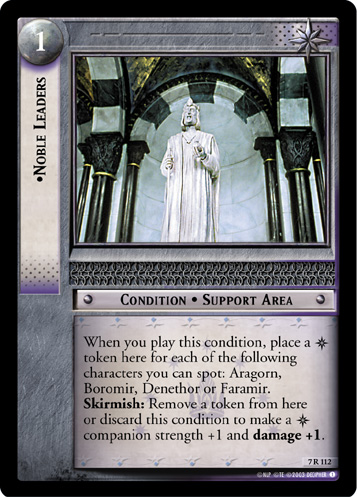
- At His Command (8C31)
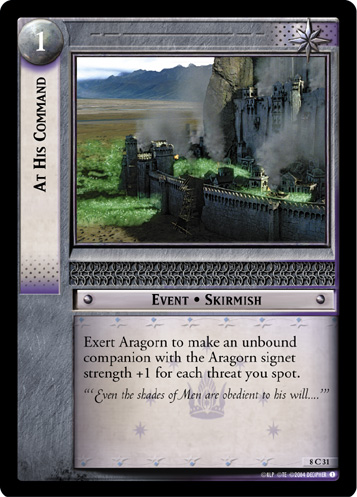
- King of the Dead, Oathbreaker (8R38)
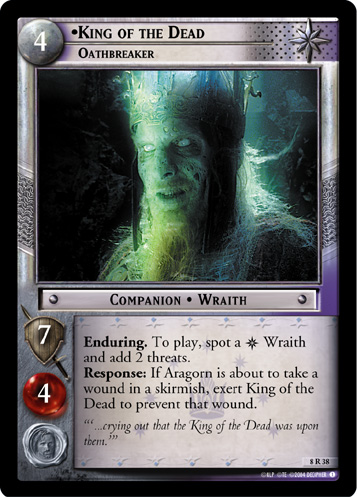
- Knife of the Galadhrim (9R+17)
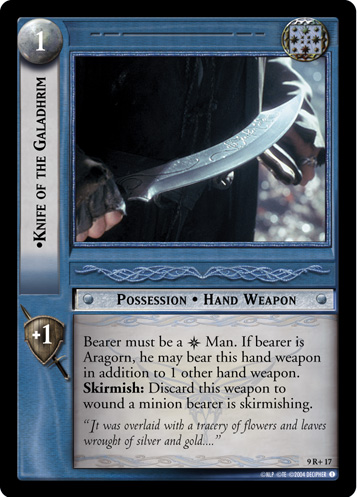 -
- Elven
- Forth the Three Hunters! (15C60)
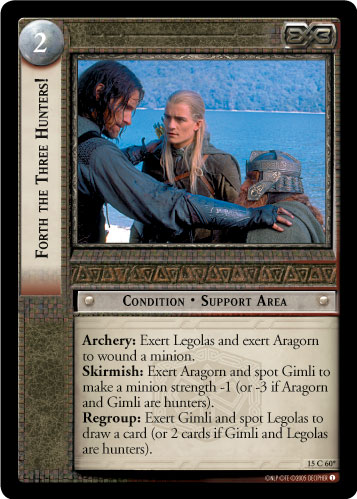 - There are three otherwise-identical versions of this card, one each for
- There are three otherwise-identical versions of this card, one each for Dwarven,
Elven, and
Gondor cultures.
- Arwen, She-Elf (15R11)
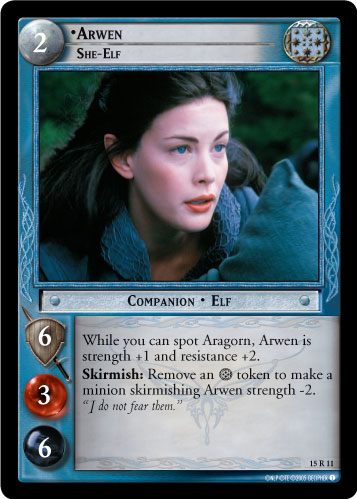 -
- Elven
- Gift of the Evenstar, Blessed Light (15U16)
 -
- Elven
- Aragorn’s Bow, Ranger's Longbow (15R56)

- No Quicker Path (15C65)
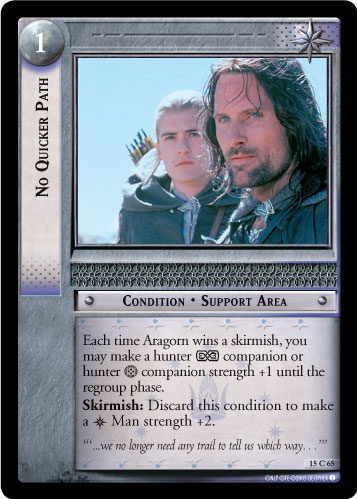
- Andúril, Sword That Was Broken (17R27)

- Crown of Gondor (18R41)
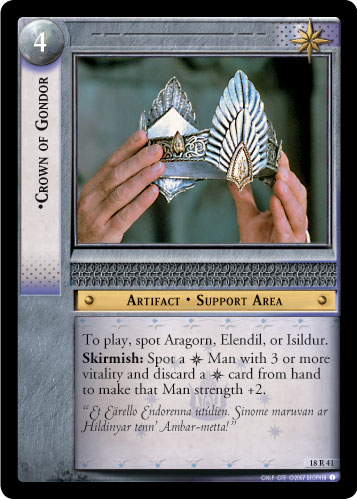
- Not Bound to His Fate (19P14)
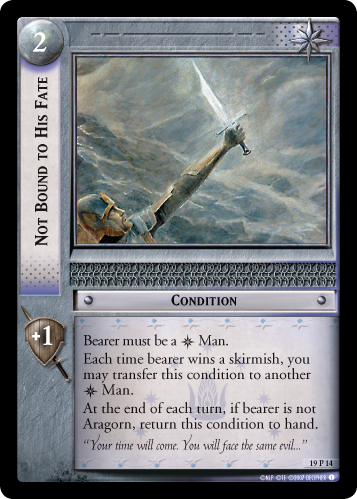
Shadow[edit]
- The Weight of a Legacy (1R282)
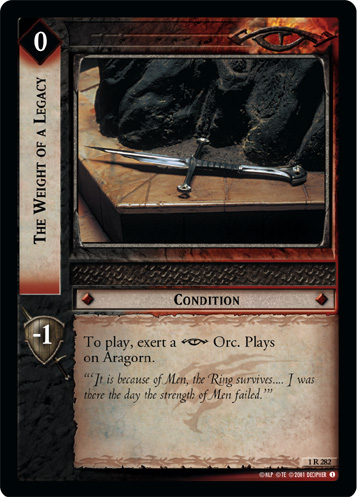
- Can You Protect Me From Yourself? (3R50)

- Beyond Dark Mountains (4C141)
